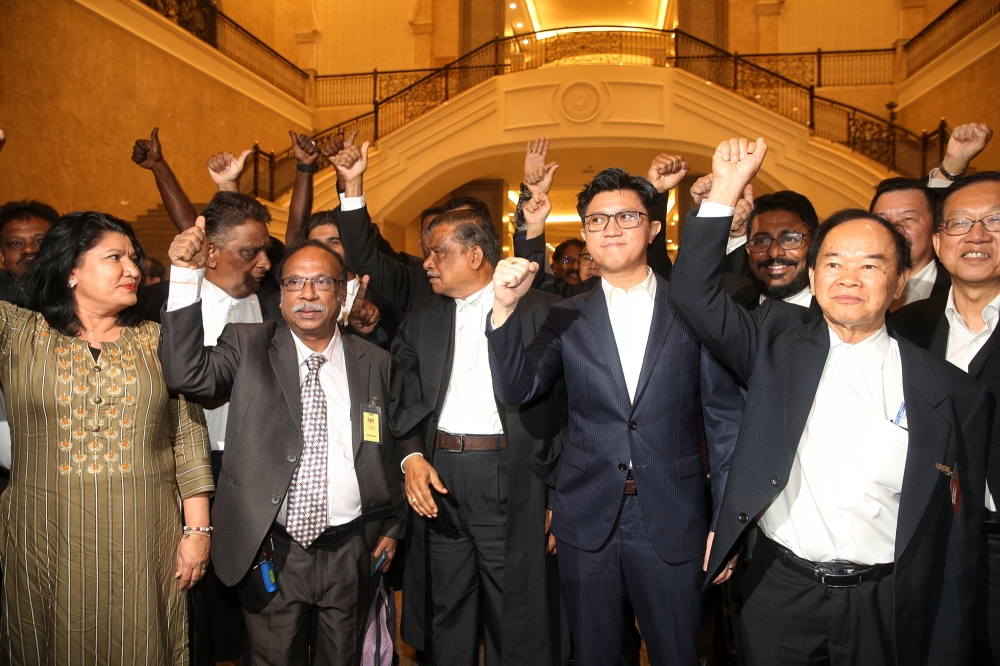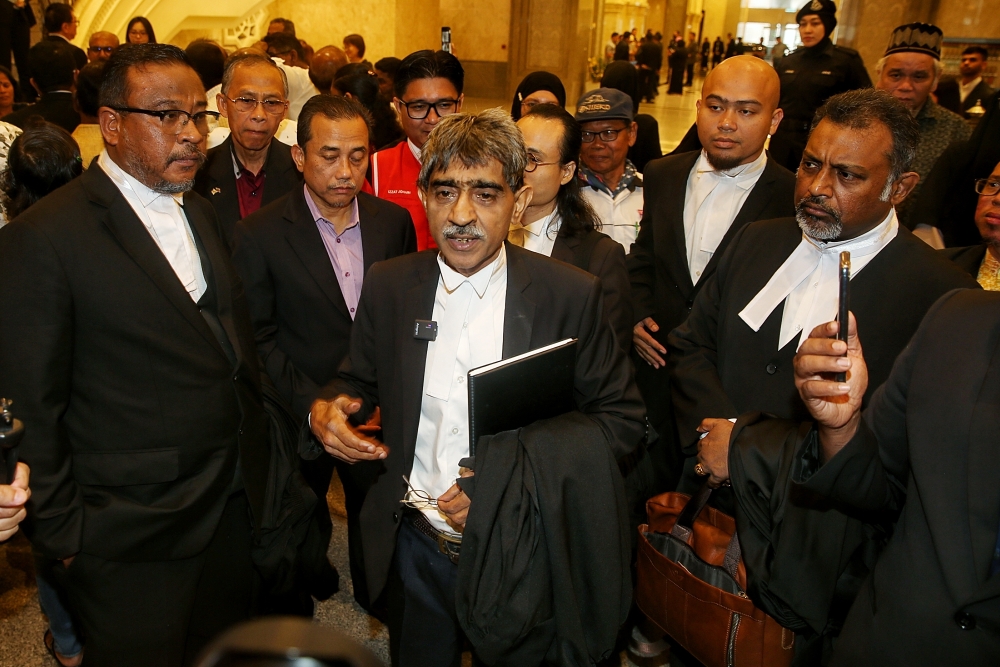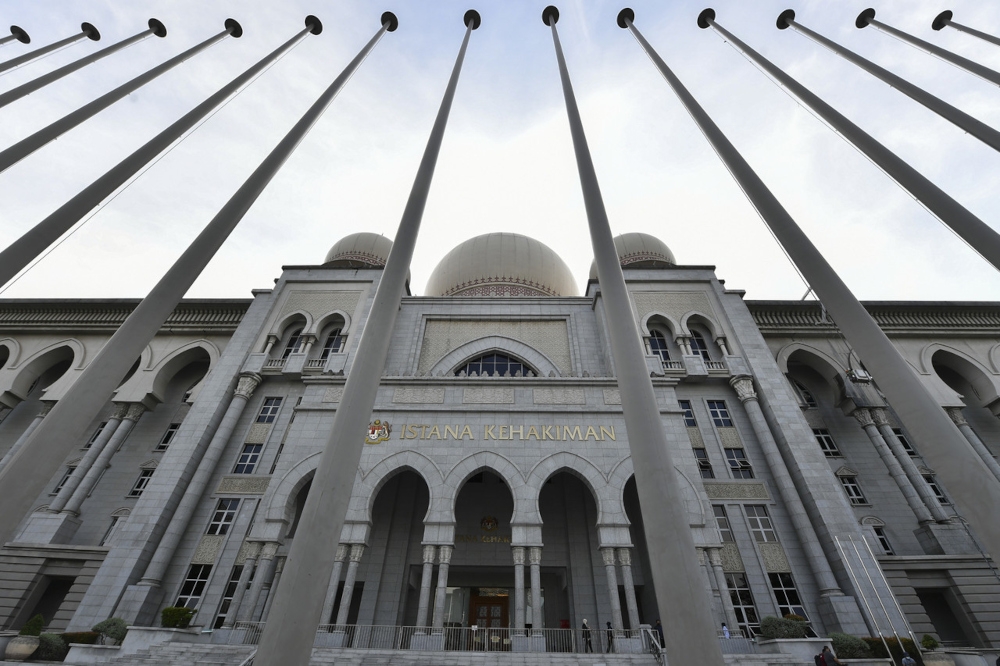PUTRAJAYA, Nov 23 — Vernacular schools in Malaysia are constitutional, a three-judge panel at the Court of Appeal said in a unanimous ruling today.
The judges said that the Federal Constitution protects the use of Tamil and Chinese in these schools even though the Malay language is recognised as Malaysia’s national language.
“We have concluded that not only are the establishment and maintenance of national type schools not inconsistent with Article 152(1) but also that the use of Tamil and Chinese in such schools are subject to protection accorded under Article 152(1)(b),” Datuk Azizul Azmi Adnan said in delivering the decision.
Article 152(1) states that the Malay language is the national language.
And sub-clause Article 152(1)(a) states that no one shall be prohibited or prevented from using (except for official purposes) or from teaching or learning any other language.
Another sub-clause Article 152(1)(b) states that nothing in Article 152(1) shall prejudice the right of the federal government or any statement government to preserve and sustain the use and study of any other community's language.
Azizul said the Court of Appeal agrees with the High Court in Kuala Lumpur’s view that the establishment and existence of national type schools — which use Tamil and Chinese for teaching – does not infringe the Articles 5, 8, 10, 11 and 12 in the Federal Constitution.
Azizul said the High Court in Kuala Lumpur was also correct to conclude that the use of Tamil and Chinese as the languages of instruction in national type schools is protected by Article 152(1)(b).
In Malaysia, the term “Chinese language”, which is a direct translation of “Bahasa Cina” as it is called in Malay, typically refers to Mandarin as it is taught in vernacular schools here; other Chinese languages like Cantonese, Hokkien, and Hakka for example are typically referred to as dialects.
Azizul said the words “preserve and sustain” in Article 152(b) gives the effect of “grandfathering” the use of other languages at the time when Merdeka was proclaimed.
Azizul said Article 152 does not limit the government's right to preserve and sustain the continued use of a language that was used immediately before Merdeka.
He said Article 152(1)(b) gives the government the right to preserve and sustain the use of non-Malay languages as a medium of instruction — which had been in use as the medium of instruction in schools even before Merdeka — and that this right in Article 152(1)(b) overrides Article 152(1)(a) which states that only the Malay language shall be used for official purposes.
The judge also said it was not disputed that schools using Tamil or Chinese had existed even before the Federal Constitution was promulgated and adopted.
The Federal Constitution, which is the highest law in the land, had governed Malaya when the Malay peninsula gained its independence from colonial British rule on August 31, 1957.
It later became the supreme law for the peninsula, Sabah, Sarawak and Singapore with the formation of Malaysia on September 16, 1963, until Singapore was expelled from the federation two years later.
“It cannot seriously be argued that the framers of the Constitution had intended for schools employing a language other than Malay or English as a medium of instruction to be unlawful and contrary to the terms of the Constitution, for if this were the case, such schools would have been shut down, abolished or converted upon the adoption of the Federal Constitution,” Azizul said.
In other words, the judge was saying that the existence of vernacular schools did not go against the Federal Constitution when the Constitution was first introduced.

Vernacular schools not public authorities requiring BM's use for ‘official purpose’
The Court of Appeal also ruled that vernacular schools did not become unconstitutional when the Federal Constitution was amended in 1971 to introduce Article 152(6).
While Article 152(1) stated the Malay language as the language that has to be used for official purposes, Article 152(6) defines “official purpose” as any purpose of the federal government or state government and includes any purpose of a public authority.
Azizul said Parliament's introduction of Article 152(6) does not make vernacular schools unconstitutional.
He said this is “because there is nothing in the record of parliamentary proceedings that suggests that Parliament had intended for the amendment to Article 152(6) to strike at the legality or constitutionality of vernacular schools”.
Azizul concluded that the Education Act 1996's provisions, which provide for the establishment and maintenance of national type schools using Tamil or Chinese as a medium of instruction, is not inconsistent with the Federal Constitution's Article 152.
Azizul said vernacular schools or national type schools are not public authorities, and “hence the use of Tamil or Chinese in these schools as a medium of instruction would not be prohibited or contrary to the Constitution”, based on Article 152(6) and Article 160(2). The judge said this was because the use of such languages in vernacular schools are not considered to be used for an official purpose.
Among other things, Article 160(2) defines “public authority” as including the federal government, a state government, a local authority or a statutory authority exercising powers vested in it by federal law or state law.
Azizul said the Court of Appeal's view is that a school is not a statutory authority or public authority, and that this means that the use of a language other than the Malay language in national type schools as a medium of instruction would not be for an “official purpose” and would be allowed under Article 152(1)(a).
Azizul said that even if the national curriculum is implemented through schools, this would not mean that schools are statutory authorities exercising powers vested in them by law, as it is the education minister who exercises this power instead.
He explained that this is why vernacular schools are not “public authorities” in which Malay must be used as the official language.
Earlier in his judgment, Azizul said the effects of the education policy are matters related to government policy and how these policies are implemented, and that it would not be for the court to intervene in government policies as the court's role is to interpret the law.

“Even if those policies run contrary, whatever may be perceived to be a desirable outcome — for example if it is argued that the existence of the national type schools has contributed to the increased polarisation of society — it would be quite beyond the pale for the courts to intervene.
“As correctly pointed out by Nazlan J at the High Court, it is not the role of the courts to review the policies of the government,” Azizul said, referring to the decision made by then High Court judge in Kuala Lumpur Datuk Mohd Nazlan Mohd Ghazali.
“The policy and intent of Parliament are simply aids to the court in interpreting legislation, and in the context of the present case, to determine whether the legislation in question is inconsistent with the terms of the Federal Constitution, as alleged by the plaintiffs,” he said, adding that the effects of government policy are irrelevant to the interpretation of Federal Constitution and laws.
After reading the broad grounds of his judgment, Azizul dismissed all the appeals by four non-governmental organisations who were challenging the constitutionality of vernacular schools.
The Islamic Education Development Council (Mappim), Confederation of Malaysian Writers Association (Gapena) and Ikatan Muslimin Malaysia (Isma) had appealed against the December 29, 2021 dismissal of their challenge on the constitutionality of vernacular schools made by the High Court in Kuala Lumpur.
Another group Ikatan Guru-Guru Muslim Malaysia (I-Guru) had appealed against a similar but separate dismissal by another High Court in Kota Baru, Kelantan on May 29, 2022 of its challenge against the constitutionality of vernacular schools.
All four non-governmental organisations today failed in their bid to overturn the two High Court decisions, which had found vernacular schools to be constitutional.
Azizul also said the appellate court allows the cross-appeal by United Chinese School Teachers’ Association of Malaysia (Jiao Zong) and United Chinese School Committees’ Association of Malaysia (Dong Zong) on the part of the High Court in Kota Baru's ruling that said vernacular schools are “public authorities” for Article 152(6). Dong Zong's and Jiao Zong's cross-appeal was not on the High Court's ruling that found vernacular schools to be constitutional.
The Court of Appeal directed the parties to bear their own legal costs as the cases involve public interest.
Today’s Court of Appeal Bench was chaired by Datuk Supang Lian with Datuk M. Gunalan making up the third judge.

Lawyer Mohamed Haniff Khatri Abdulla, who represented Mappim and Gapena, told reporters outside the court later that his clients respect the decision made today even as he affirmed that the non-governmental organisations (NGOs) would be filing for leave to appeal at the Federal Court.
But he said it has yet to be decided if all four of the NGOs would be included in the bid to appeal to the apex court.
“That will be further discussed whether all or a few, because it involves high costs.
“So we will discuss with all our clients, Isma, Gapena and Mappim to decide how and who will lead the appeal later,” the lawyer said.
He added that the application for leave to appeal would be filed at the Federal Court within 30 days from today.
An appeal to the Federal Court is not automatically granted, and the Federal Court's leave or permission would have to be obtained first in order for the appeal to be heard.
In a long list of parties represented by an equally long list of lawyers at the Court of Appeal, Aidil Khalid also represented Mappim and Gapena; while Isma was represented by Mohd Khairul Azam Abdul Aziz, Muhammad Hariz Md Yusoff, and Danial Farhan; and I-Guru's legal team comprised Datuk Shaharudin Ali, Muhammad Noor Azfar Noor Azmi and Ramesh N P Chandran.
Those were the four NGOs that challenged the constitutionality of vernacular schools at the Court of Appeal.
The other parties view vernacular schools to be constitutional: The education minister and the Malaysian government which were represented by senior federal counsel Liew Horng Bin; Parti Gerakan Rakyat Malaysia; MIC; MCA; Jiao Zong; Dong Zong; Chong Hwa Independent High School of Kuala Lumpur; Persatuan Thamizhar Malaysia; Persatuan Tamilar Thirunal Perak; Persatuan Gabungan Kebajikan Guru-guru Bersara Sekolah Tamil Malaysia; Majlis Bahasa Cina Malaysia; Persatuan Tamil Neri Malaysia; and Gabungan Persatuan Bekas Pelajar Sekolah Tamil Malaysia (Pertama).



















